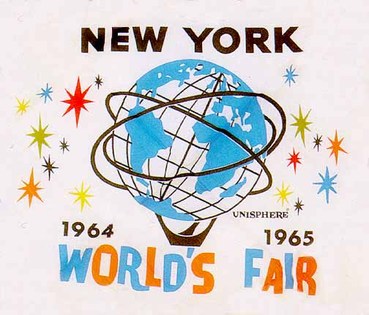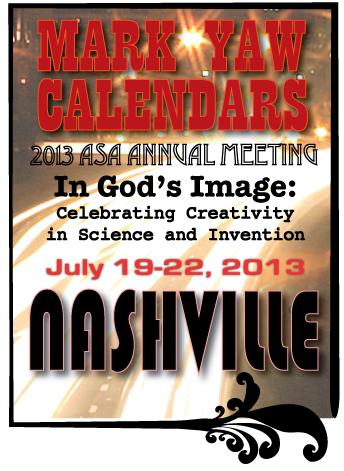"Great Gravity" is featured every edition of God & Nature Magazine, and tells the story of BNL physicist Bill Morse's journey through the world of muons and quarks, colliders and bubble chambers, with the heart of a committed Catholic and longtime-teacher of Sunday school. Read the first post in this series here.
The College Years
 Poster for the 1964 World's Fair
with Bill Morse
During my senior year in high school, I took physics. Due to a combination of senioritis, and a book/teacher that placed too much emphasis on mechanical advantage and other boring things, I didn't like it too much. My class standing was sixth out of a class of one hundred seven, but I was the number one boy. I applied to the University of Maine. At public university prices, my parents could afford to pay only my college transportation costs, plus $5/week—so for a back-up second choice, I applied to West Point. Of course, this made absolutely no sense at all (I wanted to be a scientist), but I was only seventeen years old, and somehow it made sense to me, then. I made the first cuts for West Point, and went to an interview at Governor's Island in New York Harbor. It was a military base at the time. That was my first time in New York City, and it was great. I went to the 1964 World's Fair in Flushing, and in the Italian Exhibit, saw Michelangelo's David and the Pieta. My folks gave me enough money for the trip, but I was running a little low, because I went to the World's Fair, and had just enough cash left for the bus trip back to Portland. However, when I asked for the ticket, the price was ten times higher than it was when coming to New York! When I asked why the ticket back was so expensive, the guy at the counter said, “Oregon’s a long way from New York!” It never occurred to me that you had to say “Portland, Maine,” not just “Portland.” When I got back, I had received the acceptance letter from the University of Maine, and so I wrote West Point and told them I was no longer interested. My parents were disappointed when I terminated my West Point application. My mother and father were from the World War II generation, and both had worked in the War effort. I’d put anthropology down as my desired major on my University of Maine application. After I had signed up for classes with my advisor, I went to buy the textbooks at the campus book store. I opened up the anthropology textbook to a random page, and there were pictures of bones. I closed the book, put it back on the shelf, and went to my advisor and told him I wanted to drop anthropology. He said, "But it's your major!" I told him I didn't care; I wanted to drop it. He said, "But you haven't been to one class yet!" I told him I didn't care, I wanted to drop it. He asked if I wanted to take a science course, and I said yes, I've always loved science. He asked if I liked math, and I told him I love math. He said, "Try physics." I told him I hate physics. He said, "Try it, and don't drop it until you've taken one class." I figured I could live with one class. The physics book was wonderful, and the professor even more wonderful. I remember when he presented simple harmonic motion: The position varies positively and negatively. The velocity varies positively and negatively. However, in a phase space plot, the length of the position squared plus the velocity times oscillation frequency squared is invariant. “Invariant” is physics jargon for constant as a function of time. This was beautiful! I was hooked on physics, and declared it as my major. My advisor was very happy. I got an A in the course; however, I soon found out this was not the physics majors’ physics course, it was the arts majors’ physics course. My sophomore year I struggled to catch up, and got a B. Although I loved the University of Maine, I had spent my whole life in Maine, so I decided to transfer to State University of New York (SUNY). The SUNY catalog said that the Stony Brook campus was the best for science. I applied, and was accepted. However, when I got there, I found out I was housed in a triple room with two other juniors. I definitely did not fit in with my roommates. Each afternoon, they walked across the railroad tracks and spent the afternoon at the local bar. I didn't have the money for this lifestyle—and besides, I needed to study! Every day, I visited the administrative office to see if I could be de-tripled. I'm sure they got sick of seeing me. One day the woman told me she had a solution. Although I was a junior, the only option was to move into a suite of freshman. However, that was fine with me, and I was moved into a very small room with a freshman, Mike, who had had it to himself, so I had much less space than before. But this didn't bother me, since they were all serious students—good times had to wait till after the studying was done. I became great friends with my suitemates Howie, Charlie, and John, but especially with Howie. Forty-four years later, Howie and I still get together every year or so for fishing trips. I’ve got a lot of great Howie stories, but I'll tell just one here. Howie believed that inanimate objects had wills of their own, especially an alarm clock that would not go off for his early class. I told him that it went off every morning, but he just shut it off. He didn't believe me. One day when I came back from class, only the clock face was on his desk. I asked what happened. He said he had decided to punish the clock, and went around campus taking it apart, dropping the pieces in garbage bins. We had a long discussion about inanimate objects. I had just about convinced him that inanimate objects could not possibly have wills when the picture above him fell off the wall and hit him on the head. That ended that discussion! Read the next post in this series here.
|




